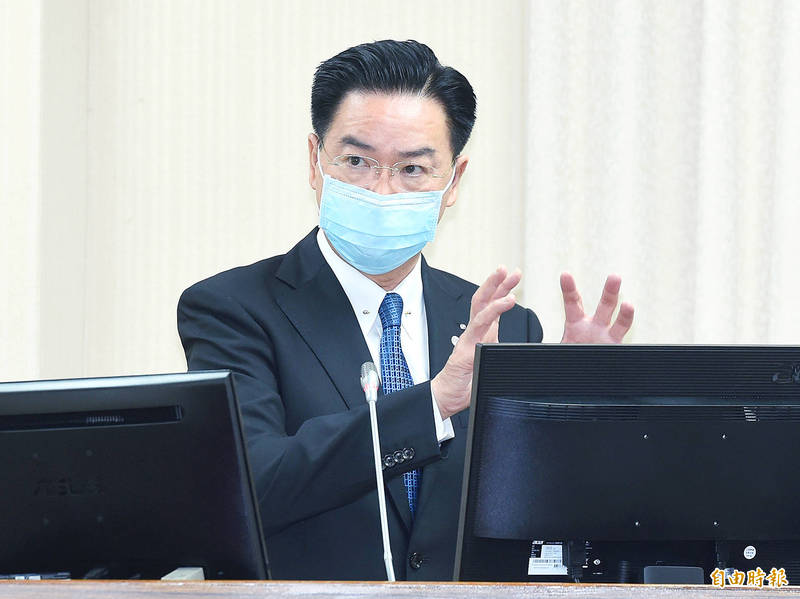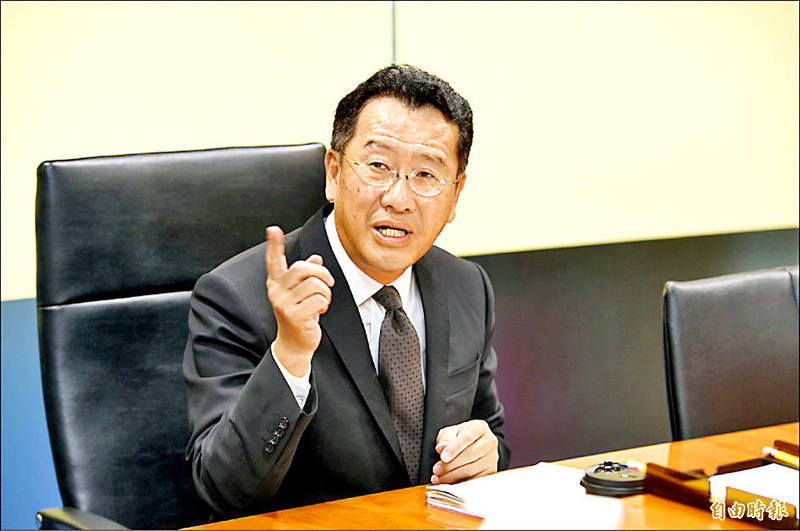《TAIPEI TIMES》China’s diplomatic ‘attacks’ likely to rise: minister

Minister of Foreign Affairs Joseph Wu speaks in the Legislature yesterday. Photo: Liao Chen-huei, Taipei Times
ALLIES TARGETED: Taiwan has received intelligence that China has increased its efforts to lure the nation’s allies into switching official recognition, Joseph Wu said
By Kayleigh Madjar / Staff writer, with Reuters and CNA
China is likely to ramp up its diplomatic “attacks” on Taiwan following the Chinese Communist Party’s (CCP) National Congress last week, including trying to snatch more of the nation’s few remaining diplomatic allies, Minister of Foreign Affairs Joseph Wu (吳釗燮) said yesterday.
The CCP wrapped up its congress on Saturday, cementing Chinese President Xi Jinping’s (習近平) grip on power.
In a report to the legislature, Wu said he expected Beijing to ramp up its “security threat and diplomatic suppression” of Taiwan.
“China is likely to increase its attacks and threats to Taiwan, especially in the diplomatic field,” Wu told lawmakers. “This is what we are worried about.”
Taiwan has received “signs” and intelligence from unspecified diplomatic allies that China is boosting efforts to lure the nation’s allies into switching official recognition to Beijing, he said.
“The diplomatic challenges we are facing are getting bigger,” he said. “Looking forward, our situation is becoming more difficult.”
Under Wu’s time in office, six countries have switched official recognition from Taipei to Beijing.
Separately, National Security Council Secretary-General Wellington Koo (顧立雄) said there are no signs that China is planning an attack on Taiwan next year, and urged Western nations to send a clear message that they would intervene if China launches a military operation against Taiwan.
Analysts’ estimates for when China would develop the ability to invade Taiwan have shortened from 2027 to 2025 and now as soon as next year.
National Security Bureau Director-General Chen Ming-tong (陳明通) last week said that if an attack occurs next year, its aim would be to force Taiwan to the negotiating table.
Speaking to political commentator Wang Shi-chi (王時齊) on her Yahoo TV show, Koo yesterday said there are no indications that military action is imminent, although it is prudent to analyze all scenarios.
China is facing mounting domestic problems, from economic decline and rising unemployment, to its “zero COVID-19” policy and US technology embargo, he said.
Beijing would continue to threaten Taiwan, but there are no warning signs of an invasion, even though it has been making preparations, he added.
Taiwan must approach the uncertainty of the next five to 10 years carefully, using a sense of worry to improve defense capabilities among the military and public “to let China know we will not give in,” Koo said.
China might have numbers on its side, but with the right weapons, Taiwan could weaken China’s willingness to invade by withstanding the first strike to launch a bruising counterattack, he said.
Meanwhile, the US and other Western countries should send a clear message to China that as soon as it makes military overtures toward Taiwan, they “would not preclude the possibility of involvement,” he said.
Asked if this is a tacit agreement between Taiwan and Western countries, Koo said that from the council’s perspective, the possibility of “intervention” cannot be ruled out.
China must first stabilize its domestic issues, Koo said, adding that he does not foresee Beijing rushing to deal with Taiwan “for at least the next two to three years.”
From a geopolitical perspective, Taiwan is on the forefront of the first island chain, meaning that an invasion would be felt much further afield, he said.
With Japan, South Korea and the Philippines all to be affected, “where would the US retreat to? Not just Guam, maybe even Hawaii,” he added.
新聞來源:TAIPEI TIMES

National Security Council Secretary-General Wellington Koo speaks during an interview in Taipei in an undated photograph. Photo: Lee Hsin-fang, Taipei Times

















